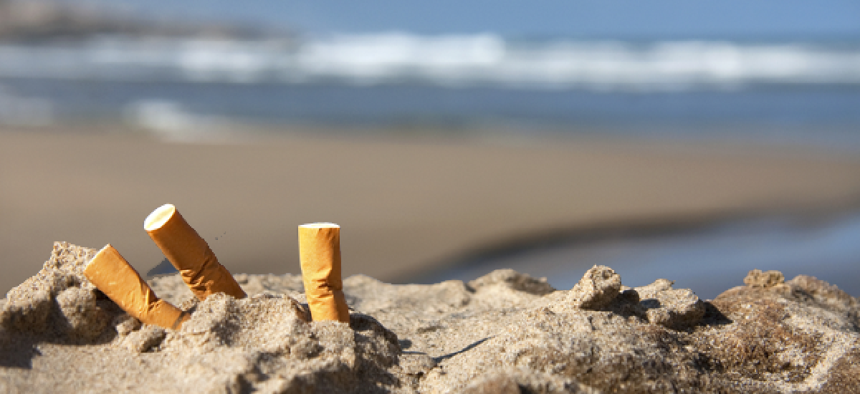Health agency looks to app for help with litter cleanup


Connecting state and local government leaders
A Montana community is photographing cigarette-related litter to gather data for new policies related to tobacco use.
Officials at the Gallatin City-County Health Department in Montana are using an app to document cigarette butt litter to push for new policies related to tobacco use.
Using Litterati, two Health Department staff members, employees at other departments and members of the community at large are documenting litter related to tobacco use. In eight and a half hours of work, app users documented almost 4,000 pieces of cigarette butt litter -- 1,515 pieces in five city parks and 2,400 in a five-block area of Main Street in downtown Bozeman.
“This has become a more visible and tangible way to demonstrate that there is a tobacco issue on our streets and specifically in our parks," Tracy Knoedler, director of human services at the department, wrote in an email. The department is using the Litterati data in conjunction in its work with city leaders to develop policies for tobacco-free parks, she said. "We are also working towards possibly expanding our Clean Indoor Air Act to include a setback from all doors and windows of public places.”
Initially a hashtag on Instagram, Litterati became its own app two years ago. Today it has about 65,000 users who have photographed trash in 115 countries.
Free to download on iOS and Android devices, the app invites users to create a profile and then snap a photo of litter. The technology geotags and time stamps the image, and users enter additional details about what the item is, what material it’s made of and even what company made it.
Anyone can see the results of Litterati users’ labors by checking the company’s map. It displays the number of trash pieces reported in various areas worldwide. Clicking on the circles zooms in for from the numbers in a state to the numbers in a county and city, and on to pins that show the exact location where individual items were found.
For example, more than 98,000 items have been tagged in the San Francisco area. Drilling down, users can see hotspots where litter may be a major problem. The United States has the most Litterati users, and they’ve tagged more than 500,000 pieces of trash, about half of which are made of plastic.
“We have confidence that the people[taking] the image, they also have the inclination to actually pick up that piece of litter and deposit it back into the garbage system,” said Dick Ayres, Litterati’s chief strategy officer.
He called the process of tagging the items “laborious,” so the company is working with image recognition firms to automate it. The goal is for the app to automatically recognize an item, whether it’s made of metal, paper or plastic and what company made it.
That level of detail is important, Ayres said, because the resulting data could push companies and governments to change their policies. A 100-day study that Litterati did in Holland found that once fast-food companies were aware that a large amount of litter in a certain area came from them, they extended their cleaning zone to make it their responsibility, not the city’s.
“Once you have the data, you can see insights that you maybe have thought about, but actually with the data, now no one can dispute them,” he said.
Although Literatti has no official contracts with governments, Bozeman’s use of the app illustrates one of many potential use cases, Ayres said. It can help the city determine the best locations for trash receptacles or study solids in groundwater by looking at how much waste is around a storm drain.
“We’re so early days, I don’t want to make an assumption that we know what governments need,” he said. “We’ve stumbled across something that has created a lot of groundswell across the planet, and we need to work with governments, and we want to work with governments.”
The National Science Foundation awarded Litterati a $225,000 Small Business Innovation Research Grant at the end of 2017 -- money that Ayres said the company will use to add the automation, reporting capabilities and gamification such as leaderboards or certificates.
“By crowdsourcing the data and cleanup, there is great potential in collecting massive amounts of information which can be used for everything from infrastructure improvement, to resource allocation, brand packaging redesign, and even individual responsibility and behavioral change,” the award contract states.
Jeff Kirschner founded Litterati after his then-four-year-old daughter pointed out a tub of cat litter in a creek, saying it didn’t belong there. That sparked something in Kirschner’s mind about how litter is part of our landscape, Ayres said.
“We’ve somewhat grown accustomed to it, but it doesn’t really belong there,” he added.
In Montana, the health department will continue to use Litterati to document tobacco use both in terms of human and environmental health, Knoedler wrote.
“Tobacco litter is the immediate concern, but ultimately we’d like to decrease if not completely eliminate tobacco use,” she wrote. It’s “the No. 1 cause of preventable death in America.”




